The European Union is preparing several responses to any further moves by Russia to destabilize Ukraine, but the bloc does not know exactly what Moscow plans to do, an EU official told Reuters on Monday:
The official said U.S. talks with Russia were “not yielding a lot” but that dialogue with President Vladimir Putin was still open through the leaders of Germany and France. They also said the EU was looking at alternative sources of energy should Russia cut sales to Europe. The bloc was preparing for refugee arrivals should Russia invade Ukraine, the official added.
“Russia is trying to demonstrate that it is the policeman in the region,” said the official, who spoke under condition of anonymity but has held phone calls with Putin in the past. “The criticism by Moscow against Ukraine is this idea that the people (in Ukraine) made a choice for liberal democracy, values, principles and freedoms.”
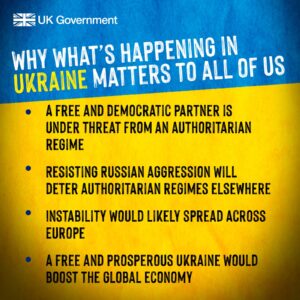 How does Russia use disinformation to undermine Ukraine? Vitalii Rubak, chief analyst at Internews Ukraine, tells Chatham House what could be done to strengthen the resilience of Ukrainian society against aggressive information.
How does Russia use disinformation to undermine Ukraine? Vitalii Rubak, chief analyst at Internews Ukraine, tells Chatham House what could be done to strengthen the resilience of Ukrainian society against aggressive information.
Tragically, the Western leaders and diplomats who are right now trying to stave off a Russian invasion of Ukraine still think they live in a world where rules matter, where diplomatic protocol is useful, where polite speech is valued. All of them think that when they go to Russia, they are talking to people whose minds can be changed by argument or debate. They think the Russian elite cares about things like its “reputation.” It does not, Anne Applebaum writes for The Atlantic:
In fact, when talking to the new breed of autocrats, whether in Russia, China, Venezuela, or Iran, we are now dealing with something very different: people who aren’t interested in treaties and documents, people who only respect hard power. Russia is in violation of the Budapest Memorandum, signed in 1994, guaranteeing Ukrainian security. Do you ever hear Putin talk about that? Of course not. He isn’t concerned about his untrustworthy reputation either: Lying keeps opponents on their toes. Nor does Lavrov mind if he is hated, because hatred gives him an aura of power.
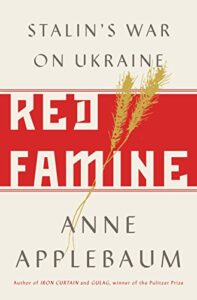 But this terrible moment represents not just a failure of diplomacy, Applebaum suggests; it also reflects a failure of the Western imagination, a generation-long refusal, on the part of diplomats, politicians, journalists, and intellectuals, to understand what kind of state Russia was becoming and to prepare accordingly.
But this terrible moment represents not just a failure of diplomacy, Applebaum suggests; it also reflects a failure of the Western imagination, a generation-long refusal, on the part of diplomats, politicians, journalists, and intellectuals, to understand what kind of state Russia was becoming and to prepare accordingly.
Putin refuses to believe that Ukrainians—or for that matter Georgians, Moldovans, or Belarusians—on their own are capable of demanding better from their leaders, say Clint Williamson and David J. Kramer. In his mind, the West must be instigating their calls for further democratization and accountable governance.
While Putin looks with trepidation at Ukrainians aspiring to live in a democracy, we should see them as worthy of our support. After all, the issues we currently confront are not just about the strategic realignment of Europe, the strength of the transatlantic alliance, or countering Russian adventurism, they write for American Purpose.
What deters Russia
Ukraine and its chaotic democracy have become a magnet for many, including Georgians, Chechens and some dissident Russians, who are opposed to Mr. Putin and his increasing dominance over the post-Soviet space, reports suggest.
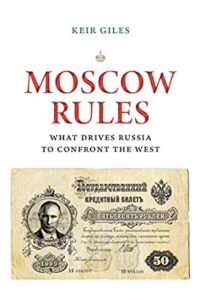 Five months ago, Chatham House published a survey of past successes and failures in dissuading Russia from aggression, titled What deters Russia, analyst Keir Giles writes for The Guardian. The case studies taken from incidents and confrontations over the decades show striking consistency: Russia achieves success when stronger adversaries back down in the face of threats, but retreats if those same adversaries demonstrate the will and determination to protect themselves, their allies or partners.
Five months ago, Chatham House published a survey of past successes and failures in dissuading Russia from aggression, titled What deters Russia, analyst Keir Giles writes for The Guardian. The case studies taken from incidents and confrontations over the decades show striking consistency: Russia achieves success when stronger adversaries back down in the face of threats, but retreats if those same adversaries demonstrate the will and determination to protect themselves, their allies or partners.
Russia’s network of propagandists, mouthpieces and influencers has been insistently pushing the idea that confronting Moscow risks almost inevitable escalation to nuclear war. That’s obscured the fact that a clash with the US and its allies is the worst-case scenario for Russia, and the prospect is one of the few genuine deterrents for Putin, adds Giles, the author of Moscow Rules: What Drives Russia to Confront the West:
The possibility of western direct support for Ukraine carries a far more immediate, direct and palpable risk for Russia than repeated warnings of further sanctions. While warning of Russia’s plans to attack, the US and its allies should also be letting Putin believe they might just do something about it.
Officials in Beijing will be closely watching the Western response to Ukraine, said Steve Tsang, director of the China Institute at London University’s School of Oriental and African Studies. “If the Western democratic response over Ukraine is in complete disarray,” he said, “then it is not unreasonable for the Chinese to assume that it would also be a shambles over Taiwan.”
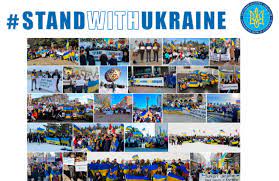 “There’s no indication at all that Putin has stopped his march towards war, his preparedness towards war,” said Michael McFaul, director of the Freeman Spogli Institute for International Studies. “Every indication is that he continues to build up his forces on all borders and from the water, against Ukraine,” he told CNBC’s “Squawk Box Asia” on Monday.
“There’s no indication at all that Putin has stopped his march towards war, his preparedness towards war,” said Michael McFaul, director of the Freeman Spogli Institute for International Studies. “Every indication is that he continues to build up his forces on all borders and from the water, against Ukraine,” he told CNBC’s “Squawk Box Asia” on Monday.
“If there’s a war tomorrow, Putin has calculated that Zelensky will be blamed for not preparing for war,” McFaul told The New York Times, referencing President Volodymyr Zelensky of Ukraine. “That doesn’t get a lot of attention in our press, but that’s a very big part of his strategy. Ideally, he would like to see democracy in Ukraine fall, and Zelensky personally fall.”
Peter Zalmayev, Director of the Eurasia Democracy Initiative, predicts the likelihood of a Russian invasion into Ukraine and what Putin’s true intent is behind the military buildup at the border, CNN’s Rosemary Church adds.
It’s an ugly moment, notes Ambassador Daniel Fried, (@AmbDanFried) Weiser Family Distinguished Fellow at the Atlantic Council. Putin either intends to launch a major war of conquest, a la WWII, or use the threat of war to subjugate Ukraine.
 Like Soviet leaders and other 20th century aggressors, Putin has the dictator’s tactical advantages of greater freedom of action, he writes for Just Security. Democracies, even with all our current faults and awful domestic challenges, have the strategic advantage of freedom and the stronger economy and political resilience that come from it. But that doesn’t make the present dangers and tough choices any easier, adds Fried, a board member of the National Endowment for Democracy (NED).
Like Soviet leaders and other 20th century aggressors, Putin has the dictator’s tactical advantages of greater freedom of action, he writes for Just Security. Democracies, even with all our current faults and awful domestic challenges, have the strategic advantage of freedom and the stronger economy and political resilience that come from it. But that doesn’t make the present dangers and tough choices any easier, adds Fried, a board member of the National Endowment for Democracy (NED).
The real issue is democracy, specifically the Kremlin’s deadly fear of even Ukraine’s current flawed and stumbling democracy, pluralism, and openness, says CEPA analyst Edward Lucas. Russia has successfully framed the discussion in Western diplomacy and the media, sowing dismay in Ukraine and division among its friends, he adds, providing essential correctives to the narrative:
- This should not be called a “crisis”, because it is not new. If you are surprised, you simply show that you were not paying attention for the past months, years, and indeed decades. Russia’s bullying approach to its neighbors was visible in the 1990s to anyone who had the wit to look. ….
- In particular, outsiders’ ability to ignore the fact that 14,000 Ukrainians have been killed, and many tens of thousands have had their lives ruined, since Russia attacked Ukraine in 2014, is shameful. The question is not “Will Russia invade Ukraine?” It already did. ….
- Russian fears of invasion or encirclement are manufactured. No neighboring country (apart perhaps from China) has remotely the military capability to attack Russia by land….
- NATO enlargement is not the result of any broken promise by the West. If Russia did not bully its neighbors they would have no reason to join a defensive alliance.
- Diplomacy alone will not solve this problem. Discussing Russia’s manufactured grievances about NATO expansion legitimizes them. So avoid that. Instead talk about other urgent topics: arms control for example. ….
- President Volodymyr Zelensky was not only a political outsider. He was from a minority: Jewish and a native Russian-speaker. His success thus belies Kremlin claims about linguistic chauvinism and right-wing extremism in Ukraine. It shows how Ukraine is not “divided” along linguistic lines. RTWT
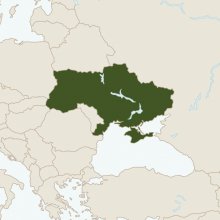
NDI
Early in his tenure, Mr. Zelensky had floated ideas of resolving the conflict with Russia by wielding Ukraine’s soft power as the largest democracy in the former Soviet Union, The Times reports.
“Ukraine will not give up on its mission to serve as an example of democracy for post-Soviet countries,” he said in his first speech on Russian policy after his election in 2019. Ukraine would resist, and accept help wherever it could, from “everyone who is ready to fight side by side with us for our freedom and for yours.”
Putin seeks to subjugate Ukraine and may risk full-scale war to do it. Europe & the US want to stop him. I discuss the hard choices and dangers. @McFaul @ACEurasia @brianoftoole @DamonMacWilson @ACEurope @RugeBoris @SlawomirDebski https://t.co/q6OA0FgMFC
— Daniel Fried (@AmbDanFried) February 13, 2022
RSVP for the 17th installment of our ongoing online discussion series “Democratic Resilience in Europe.” This webinar, “Defending Democracy in Ukraine = Defending Democracy Everywhere,” will be held Feb. 24 at 9:00-10:15 a.m. EST/UTC-5 Register today!https://t.co/u5qn3Eg7Pe
— IFES (@IFES1987) February 14, 2022







